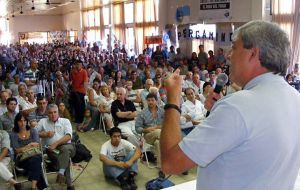MercoPress. South Atlantic News Agency
Argentina Farmers Threaten Second Strike of 2011
 Eduardo Buzzi during the farmers meeting
Eduardo Buzzi during the farmers meeting Argentine farmers threatened to go on strike for a second time this year if the government does not change their policy towards them. At a meeting in Buenos Aires province city, Bahia Blanca, farm workers leaders met to discuss the week-long strike, which began last Monday. Farmers have stopped the sale of wheat, corn and soybean over export curbs.
Farmers are protesting against a system of export quotas that they claim allows buyers to pay them low prices. Eduardo Buzzi, president of the Argentine Agriculture Association said “the halting of the sale of grains is taking place because the government decided to transfer farmer’s money to the big companies, that’s why this strike is justified, it should end on Sunday night, but we’ll see if it does, because the trade secretary continues to makes decisions that favour big companies and not farmers.”
Argentine farmers and the government have been at loggerheads for three years over export curbs aimed at taming inflation and guaranteeing affordable supplies of everyday staples. They claim that the system of wheat and corn exports lets mill and exporters pay farmers low prices and they have constantly been asking the government to do away with the restraints. Argentina is one of the world’s largest food providers.
During their meeting on the third day of the current strike the rural leaders said the government has yet to respond to their demands. One of the leaders suggested that they monitor prices paid in the local market during the coming days before deciding whether to call for another strike. “if things don’t go back to normal, we will call for another commercial strike. We have to continue, we have to make progress,” said Mario Llambas leader of the Argentine Rural Confederation.
“Our intention is to find solutions, so farmers are no longer robbed, as they have been robbed for the last five years. What we want is a fair price,” he added.
Following the government’s intervention in the wheat market, claiming they wish to protect Argentine consumers, the price of bread has increased 140% according to the farmer’s leaders and the farmers themselves receive less than 10% of what a kilo of bread costs the public.
The latest strike and uncertainty is bad news for President Cristina Fernandez de Kirchner as presidential elections are just nine months away. President Kirchner is expected to seek re-election.
“A very large number of farmers have gone on strike and are demanding more action and strikes and it is surprising the government isn’t doing anything,” said rural sources.
The government has maintained restrictions on the exports of wheat, corn and meat, claiming they want to control the country’s inflation. Farmers claim the restrictions do not stop food prices increasing, but favour mill and export companies, who are able to purchase grains at low prices as there is.
If demands are not met by the weekend, rural leaders will decide whether to continue with the strike.




Top Comments
Disclaimer & comment rules-

-

-

Read all commentsThe EU should show solidarity with the farmers of Argentina and stand against big Business and invasive Government.
Jan 20th, 2011 - 09:39 am 0We all support the strike, it might be the only way to sell agroproducts at an even higher price, if farmers really wanted money, I hope they are ready to milk the cow when the time is right, this export strike can't last for ever and can only help to inflate prices, other then that Argentina will moslikely say “If you didn't sow you will not reap”, people who don't hunger today will hunger tomorrow and that is how you condition any beast into submition, it's really sad to think that this farmer are digging their own economic grave by part taking in the strike probably runned by corporates who work “sweat shop”s style farm plots, I have a better political issue that might need the atention of tfarmers in Argentina, for example barrick gold is polluting the rivers in San Juan Argentina and poisibly destroying the agriculural industry mainly wine with the disposal of arsenics acids in the rivers, and the destruction of toro 1 and toro 2 glaciers.
Jan 20th, 2011 - 07:57 pm 0wake up everyone and smell the coffe burning.
You do realize that when there is a farm strike there are no exports so they aren't benefiting from the temporarily higher prices, USA and Brazil do though, so when they stop striking the price goes down and they get the lower price. You get that right? I know you absolutely don't understand math or economics so I tried to explain it as simply as I can.
Jan 21st, 2011 - 08:42 pm 0Commenting for this story is now closed.
If you have a Facebook account, become a fan and comment on our Facebook Page!